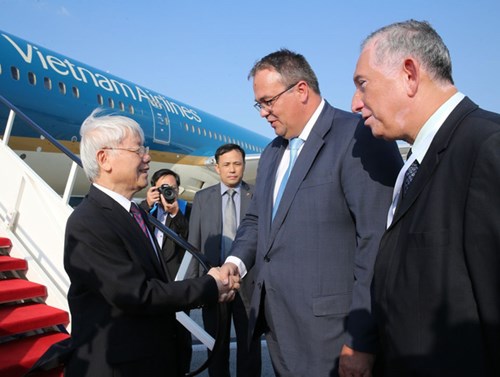The visit of the Vietnam’s Party leader to Hungary has been expected to lift the bilateral ties between Vietnam and Hungary to a new height.
    |
 |
|
Csaba Balogh (second from right), Minister of State at the Hungarian Ministry of Foreign Affairs and Trade and Chairman of the Hungary-Vietnam Cooperation Subcommittee, welcoming Party General Secretary Nguyen Phu Trong at Ferenc Liszt International Airport |
Located in Central Europe, Hungary shared the border with Ukraine, Romania, Serbia, Slovenia, Croatia, and Slovakia. The country has a total area of over 93,000 sq.km with the population of approximately 9.8 million.
The Fidesz–KDNP Party Alliance has been the ruling Party of the country since 2010. The Party gained victory at the 2018 Hungarian parliamentary election and it will continue ruling the country in the next four years.
The country started to partially liberalize its economy in 1968 and became a market economy in 1990. The global financial crisis in 2008 hit many countries around the world, including Hungary. Thanks to great efforts and sound policies of the government, the economy has gradually recovered since 2010. It has been a highlight in economic growth in the European Union (EU) in recent years.
Regarding its foreign policy, Hungary prioritizes deeper integration in the EU as well as its relationships with neighboring and countries in the region while putting emphasis on energy diplomacy and protection of overseas Hungarians’ legitimate interests.
In its Eastward policy, the country bolsters tie with Russia, countries in Central Asia and the Middle East while, in its Southward policy, restoring relations with traditional partners in Asia, with Vietnam as a priority. It is now a member of many regional and international organizations, such as OECD, NATO and UN.
Vietnam and Hungary established diplomatic relations on Feb. 3, 1950. Since then, this Central European country has provided much support for the cause of national construction and defense of Vietnam. The relationship between the two countries has recently witnessed positive developments in such areas as delegation exchange at all levels and coordination and support at multilateral forums. The Hungarian Government pledged to back Vietnam in the latter's run for a non-permanent membership of the UN Security Council in the 2020-2021 tenure.
In recent years, the bilateral trade value grew strongly. The two-way trade turnover increased from only USD 144.70 million in 2010 to USD 354.3 million in 2017. In the first five months of this year, the figure reached USD 209 million. Vietnamese exports to the Hungarian market include electric and electronic devices, joinery, accessories for pumping machines, garments and aquatic products while Vietnam imports medicines, machinery, equipment, and livestock feed from Hungary.
As of April 2018, Hungary had 17 operational projects in Vietnam with the total registered capital of USD 63.56 million, ranking the 57th out of 126 countries and territories investing in the country. The Hungarian Government has earmarked a credit package of EUR 500 million at a preferential interest rate for Vietnam to implement projects in healthcare services, water treatment, information technology and agriculture.
The bilateral ties have also developed in such fields as defense, security, health, education, and multilateral cooperation. Hungary is the only country in the former Eastern bloc that continually increases scholarships for Vietnamese students. As from the 2018-2019 academic year, Hungary will provide Vietnam with 200 scholarships per year. Education cooperation is a traditional field and also a highlight in the current bilateral ties.
Party General Secretary Nguyen Phu Trong is the first leader of Vietnam to pay an official visit to a country in the former Eastern bloc since the region experienced big political changes in the 1990s. The visit is also expected to strengthen the traditional friendship and multi-faceted cooperation between Vietnam and Hungary and advance bilateral relations to a comprehensive partnership in order to make more positive and practical developments in bilateral relations between Vietnam and Hungary.
Translated by Trung Thanh